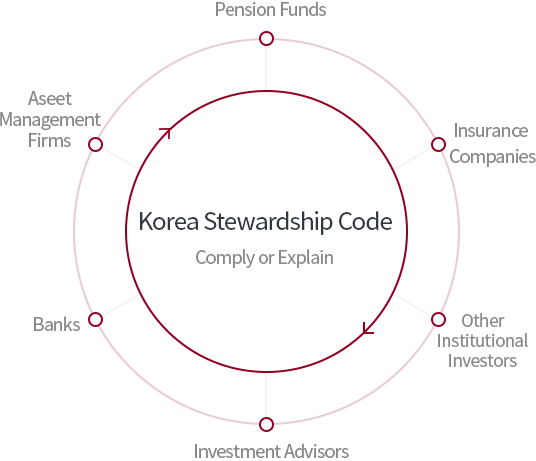Purpose of the Code
The Korea Stewardship Code, the “Principles on the Stewardship Responsibilities of Institutional Investors”, sets forth seven detailed principles and guidelines that institutional investors holding the shares of publicly listed companies in Korea should follow to fulfill their fiduciary duties as a steward taking care of and managing the assets entrusted by others. Institutional investors should discharge their fiduciary responsibilities faithfully through the shareholder activities such as monitoring investee companies and actively engaging in a dialogue with them if a concern is identified. These activities can not only induce mid- and long-term growth of investee companies and contribute to higher returns for their clients and beneficiaries, but also support the growth and development of the capital markets and the overall economy.
- 01Enhance mid- and long-term corporate value of investee companies and ensure their sustained growth
- 02Promote mid- and long-term interests of clients and beneficiaries
- 03Support the healthy growth and development of the Korean capital markets and the economy as a overall economy.
Seven Principles
The Korea Stewardship Code sets forth the following seven principles as a soft law:
- Principle 1Institutional investors, as a steward of assets entrusted by their clients, beneficiaries, etc., to take care of and manage, should formulate and publicly disclose a clear policy to faithfully implement their responsibilities
- Principle 2Institutional investors should formulate and publicly disclose an effective and clear policy as to how to resolve actual or potential problems arising from conflicts of interest in the course of their stewardship activities.
- Principle 3Institutional investors should regularly monitor investee companies in order to enhance investee companies’ mid- to long-term value and thereby protect and raise their investment value.
- Principle 4 While institutional investors should aim to form a consensus with investee companies, where necessary, they should formulate internal guidelines on the timeline, procedures, and methods for stewardship activities.
- Principle 5Institutional investors should formulate and publicly disclose a voting policy that includes guidelines, procedures, and detailed standards for exercising votes in a faithful manner, and publicly disclose voting records and the reasons for each vote so as to allow the verification of the appropriateness of their voting activities.
- Principle 6Institutional investors should regularly report their voting and stewardship activities to their clients or beneficiaries.
- Principle 7Institutional investors should have the capabilities and expertise required to implement stewardship responsibilities in an active and effective manner.
 Korea Stewardship Code
Korea Stewardship Code
Comply or Explain
Pension FundsInsurance companiesOther Institutional InvestorAdvisory FirmsBanksAsset Management Firm- Target Institutions
-
The Code only applies to the institutions who have explicitly declared participation in the Principles, including institutional investors such as asset management companies, insurers, and pension funds, and proxy advisors and investment advisory firms helping their shareholder engagement.
- Approach to Code Compliance
-
Comply or Explain
It is desirable that institutional investors who are participating in the “Principles” implement all the 7 detailed principles and guidelines. If any principle is not implemented in an exceptional case, the reason and an alternative should be sufficiently explained and disclosed.
- TEL : +82-2-3775-3339
- FAX : +82-2-3775-2630
- E-MAIL : stewardshipcode@cgs.or.kr
COPYRIGHT © 2018 KOREA INSTITUTE OF CORPORATE GOVERNANCE AND SUSTAINABILITY.
ALL RIGHTS RESERVED.
한국기업지배구조원은 개인정보보호법 등 관련 법령에 의거하여, 정보주체로부터 개인정보를 수집함에 있어 아래 내용을 안내하고 있습니다. 정보주체가 되는 이용자께서는 아래 내용을 자세히 읽어보시고, 모든 내용을 이해하신 후에 동의 여부를 결정하여 주시기 바랍니다.
- 1. 개인정보의 수집 및 이용목적
- - 한국기업지배구조원은 홈페이지 이용자들에게 메일링 서비스를 제공하기 위하여 이용자 개인의 정보를 수집ㆍ이용하고 있습니다.
- - 본 개인정보는 당사 이메일 서비스 제공의 목적으로만 사용 됩니다.
- 2. 수집하려는 개인정보의 항목
- - 필수항목 : 이름, E-MAIL
- - 선택항목 : 직장명, 직종, 관심분야
- 3. 개인정보의 보유 및 이용기간
- - 메일링 서비스 중지시까지 보관
- 4. 동의를 거부할 권리 및 동의 거부에 따른 안내
- - 이용자는 본 안내에 따른 개인정보 수집에 대하여 거부를 하실 수 있는 권리가 있습니다.
- - 본 개인정보 수집에 대하여 거부하시는 경우, 회원 가입이 이루어지지 않음에 따라 당사의 이메일 관련 서비스를 이용하실 수 없습니다.
| 이름 |
홍길동 |
|---|---|
| 이메일 |
@
|
| 직장명 | |
| 직종 | |
| 관심분야 |
| 이름 |
홍길동 |
|---|---|
| 이메일 |
@
|